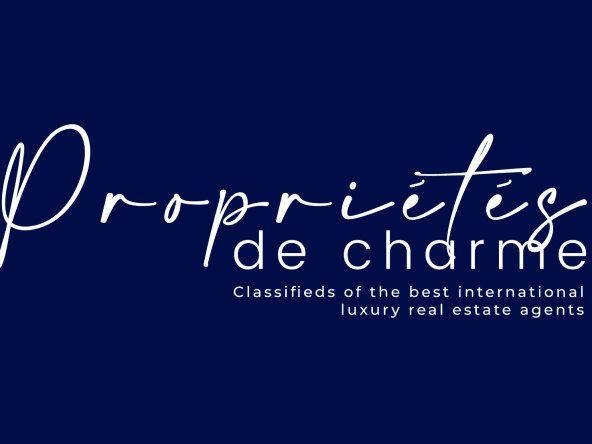Sale of Properties Classified as Historic Monuments in France: Complete Guide for Buyers and Sellers
France is known for its exceptional cultural and architectural heritage, home to numerous properties classified as Historic Monuments. These properties, witnesses to a rich and varied history, attract both buyers looking for character and authenticity and sellers wishing to take advantage of their heritage. In this article, we will explore the market for properties classified as Historic Monuments, the specifics of their sale, the advantages of such an investment, and practical advice for buyers and sellers. We will also highlight the crucial role of luxury real estate agencies specializing in this area.
What is a Historical Monument?
A Historic Monument is a building or site protected by the State because of its historical, artistic or architectural importance. In France, the classification can be national or registered as a Historic Monument. This classification provides a legal framework that protects the building and its integrity, while allowing owners to benefit from certain tax advantages and subsidies for restoration.
Why Invest in a Classified Property?
1. Unique Cultural Heritage
Owning a property classified as a Historic Monument means becoming the guardian of an inestimable cultural heritage. These properties offer a tangible connection to the past and allow owners to be an integral part of French history.
2. Fiscal advantages
Owners of classified properties can benefit from significant tax advantages. Restoration work may qualify for tax reductions, and in some cases, grants may be awarded to help preserve the property. This can make acquiring and managing these assets more affordable in the long term.
3. Appreciation of Value
Listed properties tend to retain their value and may even appreciate in value over time, especially if they are well maintained. The tourist and cultural appeal of these properties also makes them interesting for seasonal rentals.
The Stages of Selling a Classified Property
1. Property Valuation
Before putting a listed property up for sale, it is essential to carry out a thorough assessment. This includes examining the general condition of the property, any necessary renovations, and the authenticity of architectural elements. Evaluations must be carried out by professionals with specific experience in the field of Historic Monuments, because the evaluation criteria differ from classic real estate.
2. Restoration and Enhancement Works
Before the sale, restoration work may be necessary to enhance the value of the property. Owners must ensure that any intervention complies with the standards for the preservation of Historic Monuments. Collaborating with specialized craftsmen and recognized architects is essential to guarantee the quality of the work. A well-maintained and beautifully restored property can attract buyers willing to invest more.
3. Choice of Real Estate Agency
Working with a luxury real estate agency specializing in the sale of listed properties is a major asset. These agencies have the expertise to navigate the sales process, from writing the listing to negotiating offers. They can also help establish a realistic and competitive selling price.
Tips for Sellers
1. Enhancement of the Assets of the Property
Highlighting the unique characteristics of your property is crucial. Whether it is exceptional architecture, a historic garden, or a privileged geographical location, every detail counts. Professional photography and virtual tours can also pique the interest of potential buyers.
2. Prepare a Complete File
A complete file on the property, including the history of the building, the work carried out, any permits and recent evaluations, can strengthen buyer confidence. Providing transparent documentation demonstrates good management of the property.
3. Be Flexible on Visits
Arranging flexible viewings can attract more potential buyers. Being available for viewings during the week and on weekends can maximize interest in your property.
The Steps of Purchasing a Classified Property
1. Search and Selection
For buyers, the search for a Historic Monument can be exciting. It is essential to focus on personal criteria, such as location, size, and architectural style. Hiring real estate agents who specialize in prestige properties can make this search much easier, as they have access to exclusive listings and properties before they go on the market.
2. Visit and Evaluation
Visiting several properties is a crucial step. During each visit, take the time to assess the general condition of the building, the quality of previous work, and the potential restoration costs. It is recommended to hire an expert to assess the property, as they will be able to identify any hidden issues that may need attention.
3. Negotiation and Purchasing
The negotiation for a classified property can be different from that of traditional properties. Buyers should be aware of specifics related to the property, such as preservation rules and legal requirements. Working with a real estate agent experienced in luxury properties can help navigate this complex process and reach a favorable deal.
Tips for Buyers
1. Know the Regulations
It is crucial for buyers to familiarize themselves with the laws that govern Historic Monuments. Obligations related to restoration, preservation, and work can be burdensome, and understanding these regulations is essential before making a purchase.
2. Hire Catering Experts
When you are considering purchasing a listed property, it may be wise to hire architects or craftsmen who specialize in the restoration of Historic Monuments. Their expertise can help assess work needs and ensure interventions meet preservation standards.
3. Plan a Budget for the Works
Restoration work can be expensive, and setting a realistic budget is crucial. Take into account the costs associated with renovation, maintenance and furnishing. Having financial flexibility can make it easier to make a purchasing decision.
The Challenges of Preservation
Buying a listed property also involves responsibilities. Owners must commit to preserving the architectural integrity of the building. This includes compliance with works and alterations regulations, as well as respect for historic features. Although these obligations may seem restrictive, they ensure that cultural heritage is protected for future generations.
The Role of Luxury Real Estate Agencies
1. Specialized Expertise
Luxury real estate agencies specializing in properties classified as Historic Monuments have in-depth knowledge of the market. Their expertise makes it possible to effectively navigate the legal and technical complexities surrounding these properties.
2. Network of Potential Buyers
These agencies also have access to a network of potential buyers interested in unique properties. Working with professionals increases the chances of selling quickly and at a competitive price.
3. Personalized Support
Luxury real estate agencies offer personalized support throughout the sale or purchase process. Their knowledge of market trends, marketing techniques and negotiation allows them to optimize results for their clients.
Conclusion
The sale of properties classified as Historic Monuments in France represents a unique opportunity for both buyers and sellers. As custodians of invaluable cultural heritage, these properties offer a connection to history and attractive investment potential. To navigate this complex market, it is essential to work with specialist luxury real estate agencies who can provide the necessary expertise and support.
Whether you are a seller looking to add value to your property or a buyer looking for a unique home, understanding the dynamics of this market, being aware of the responsibilities that come with ownership, and working with real estate professionals can help you to achieve your objectives in the sector of properties classified as Historic Monuments in France.
Follow “ ProprietesDeCharme.com ” on YouTube Facebook Twitter LinkedIn Instagram Pinterest




